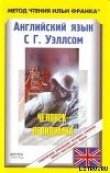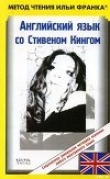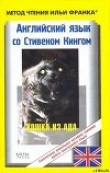
Текст книги "Агата Кристи. Убийство в Восточном Экспрессе"
Автор книги: Агата Кристи
Соавторы: Илья Франк,Ольга Ламонова
Жанр:
Языкознание
сообщить о нарушении
Текущая страница: 6 (всего у книги 48 страниц) [доступный отрывок для чтения: 18 страниц]
“Elle est jolie – et chic (фр. красавица и какая элегантная),” murmured Poirot (пробормотал Пуаро). “Husband and wife – eh (муж и жена, не правда ли)?”
M. Bouc nodded (мсье Бук кивнул). “Hungarian Embassy, I believe (/из/ венгерского посольства, я полагаю; to believe – верить; думать, полагать, считать),” he said. “A handsome couple (красивая пара).”
There were only two more lunchers (/оставались/ еще только двое обедающих; to lunch – завтракать или обедать в середине дня) – Poirot’s fellow traveller MacQueen (попутчик Пуаро Маккуин) and his employer Mr. Ratchett (и его работодатель, мистер Рэтчетт; to employ – предоставлять работу, нанимать). The latter sat facing Poirot (последний /из двух/ сидел лицом к Пуаро; to face – находиться лицом к; face – лицо, физиономия), and for the second time (и вот уже во второй раз; time – время; раз, случай) Poirot studied that unprepossessing face (Пуаро изучал/рассматривал это не располагающее к себе лицо; to prepossess – охватывать /о чувстве/; производить /благоприятное/ впечатление), noting the false benevolence of the brow (замечая фальшиво благожелательное выражение лица; to note – замечать, обращать внимание; benevolence – благожелательность; добросердечие, brow – бровь; выражение лица, вид) and the small, cruel eyes (и маленькие жестокие глаза).
Hungarian [hʌŋˈɡe(ǝ)rɪǝn] embassy [ˈembǝsɪ] unprepossessing [ˌʌnpri:pǝˈzesɪŋ] benevolence [bɪˈnev(ǝ)lǝns] cruel [ˈkru:ǝl]
“Elle est jolie – et chic,” murmured Poirot. “Husband and wife – eh?”
M. Bouc nodded. “Hungarian Embassy, I believe,” he said. “A handsome couple.”
There were only two more lunchers – Poirot’s fellow traveller MacQueen and his employer Mr. Ratchett. The latter sat facing Poirot, and for the second time Poirot studied that unprepossessing face, noting the false benevolence of the brow and the small, cruel eyes.
Doubtless M. Bouc saw a change (несомненно, мсье Бук увидел перемену) in his friend’s expression (в выражении /лица/ своего друга).
“It is at your wild animal you look (это вы на своего дикого зверя смотрите)?” he asked.
Poirot nodded (Пуаро кивнул).
As his coffee was brought to him (когда ему принесли его кофе), M. Bouc rose to his feet (мсье Бук поднялся на ноги). Having started before Poirot (начав /обедать/ раньше Пуаро) he had finished some time ago (он уже закончил /есть/ некоторое время тому назад).
“I return to my compartment (пойду в свое купе),” he said. “Come along presently (приходите сразу же /после обеда/) and converse with me (и поболтайте со мной; to converse – разговаривать; общаться).”
“With pleasure (с удовольствием).”
doubtless [ˈdaʋtlɪs] animal [ˈænɪm(ǝ)l] converse [kǝnˈvǝ:s]
Doubtless M. Bouc saw a change in his friend’s expression.
“It is at your wild animal you look?” he asked.
Poirot nodded.
As his coffee was brought to him, M. Bouc rose to his feet. Having started before Poirot he had finished some time ago.
“I return to my compartment,” he said. “Come along presently and converse with me.”
“With pleasure.”
Poirot sipped his coffee (Пуаро выпил кофе небольшими глотками) and ordered a liqueur (и заказал ликер; to order – приказывать; заказывать). The attendant was passing from table to table (официант переходил от столика к столику; attendant – спутник; обслуживающее лицо, слуга) with his box of money (с коробкой для /сбора/ денег), accepting payment for bills (принимая плату по счетам; to accept – принимать, брать). The elderly American lady’s voice (голос пожилой американской дамы) rose shrill and plaintive (сорвался: «поднялся» на заунывный визг; shrill – пронзительный, резкий, визгливый; plaintive – печальный, грустный).
“My daughter said (моя дочь сказала): ‘Take a book of food tickets (возьми/приобрети книжку с талонами на питание; ticket – билет; квитанция, талон) and you’ll have no trouble (и у тебя не будет забот; trouble – беспокойство, волнение; затруднение) – no trouble at all (вообще никаких забот).’ Now, that isn’t so (а теперь /выходит/, что это не так). Seems they have to have a ten per cent tip (оказывается, они должны получить чаевые десять процентов /по счету/) and then there’s that bottle of mineral water (а еще и бутылка минеральной воды /тоже оплачивается отдельно/) – and a queer sort of water too (и странная к тому же вода какая–то; sort – вид, род, сорт). They didn’t have any Evian or Vichy (у них нет «Эвиан» или «Виши»), which seems queer to me (что мне кажется странным/подозрительным).”
liqueur [lɪˈkjʋǝ] plaintive [ˈpleɪntɪv] per cent [pǝˈsent] queer [kwɪǝ]
Poirot sipped his coffee and ordered a liqueur. The attendant was passing from table to table with his box of money, accepting payment for bills. The elderly American lady’s voice rose shrill and plaintive.
“My daughter said: ‘Take a book of food tickets and you’ll have no trouble – no trouble at all.’ Now, that isn’t so. Seems they have to have a ten per cent tip, and then there’s that bottle of mineral water – and a queer sort of water too. They didn’t have any Evian or Vichy, which seems queer to me.”
“It is – they must (это – они должны) – how do you say (как вы сказали)? – serve the water of the country (подавать на стол воду этой страны = местную воду; to serve – служить, быть слугой; подавать /на стол/, разносить /пищу, напитки/),” explained the sheep–faced lady (объяснила дама с лицом овцы).
“Well, it seems queer to me (что ж, мне это кажется странным/подозрительным).” She looked distastefully (она с отвращением взглянула; distasteful – неприятный, тошнотворный, противный) at the heap of small change (на кучку мелочи; change – перемена, изменение; разменная монета, сдача; small change – мелкие деньги) on the table in front of her (на столе перед ней). “Look at all this peculiar stuff (взгляните на все эти странные деньги: «штуки»; peculiar – специфический; странный, необычный; stuff – материал; вещь, штука; разг. деньги) he’s given me (что он мне надавал). Dinars or something (динары или что–то вроде). Just a lot of rubbish (просто куча мусора; lot – жребий; разг. большое количество, множество), it looks like (выглядит именно так)! My daughter said (моя дочь сказала) – ”
distasteful [dɪsˈteɪstf(ǝ)l] peculiar [pɪˈkju:lɪǝ] dinar [ˈdi:nɑ:] rubbish [ˈrʌbɪʃ]
“It is – they must – how do you say? – serve the water of the country,” explained the sheep–faced lady.
“Well, it seems queer to me.” She looked distastefully at the heap of small change on the table in front of her. “Look at all this peculiar stuff he’s given me. Dinars or something. Just a lot of rubbish, it looks like! My daughter said – ”
Mary Debenham pushed back her chair (Мэри Дебенхэм отодвинула свой стул; to push – толкать, пихать; to push back – отталкивать назад; отодвигать) and left with a slight bow to the other two (и удалилась, слегка поклонившись двум другим /женщинам/; to leave (left) – уходить, уезжать; slight – тонкий; слабый, незначительный; bow – поклон). Colonel Arbuthnot got up (полковник Арбэтнот поднялся) and followed her (и последовал за ней). Gathering up her despised money (подбирая свои презренные деньги; to gather – собирать; to gather up – подбирать /что–либо с пола, земли и т.п./, to despise – презирать) the American woman followed suit (американка последовала /их/ примеру; suit – прошение, ходатайство; to follow suit – следовать примеру, подражать), followed by the other one like a sheep (/за ней/ последовала другая /женщина/, похожая на овцу). The Hungarians had already departed (венгры /к тому времени/ уже ушли; to depart – отбывать; уходить). The restaurant car was empty (вагон–ресторан был пустым; car – автомобиль; железнодорожный вагон) save for Poirot and Ratchett and MacQueen (за исключением Пуаро, Рэтчетта и Маккуина; save – кроме, за исключением).
Ratchett spoke to his companion (Рэтчетт сказал /что–то/ своему спутнику; to speak (spoke, spoken)), who got up (который поднялся) and left the car (и покинул вагон; to leave (left)). Then he rose himself (затем он сам встал; to rise (rose, risen)), but instead of following MacQueen (но вместо того, чтобы последовать за Маккуином) he dropped unexpectedly (он неожиданно опустился; to drop – капать; опускаться; to expect – ожидать) into the seat opposite Poirot (на стул: «место» напротив Пуаро).
chair [tʃeǝ] despise [dɪsˈpaɪz] instead [ɪnˈsted] unexpected [ˌʌnɪkˈspektɪd]
Mary Debenham pushed back her chair and left with a slight bow to the other two. Colonel Arbuthnot got up and followed her. Gathering up her despised money the American woman followed suit, followed by the other one like a sheep. The Hungarians had already departed. The restaurant car was empty save for Poirot and Ratchett and MacQueen.
Ratchett spoke to his companion, who got up and left the car. Then he rose himself, but instead of following MacQueen he dropped unexpectedly into the seat opposite Poirot.
“Can you oblige me with a light (не одолжите огонька /прикурить/; to oblige – обязывать; делать одолжение; light – свет; огонь, пламя, искра)?” he said. His voice was soft (он говорил вполголоса; soft – мягкий; нежный, еле уловимый, тихий) – faintly nasal (слегка в нос; nasal – назальный; гнусавый). “My name is Ratchett (меня зовут Рэтчетт: «моя фамилия Рэтчетт»).”
Poirot bowed slightly (Пуаро слегка кивнул). He slipped his hand into his pocket (он сунул руку в карман; to slip – скользить; to slip smth. into smth. – незаметно, потихоньку всунуть что–либо куда–либо) and produced a matchbox (и достал коробок спичек; to produce – предъявлять) which he handed to the other man (который он и вручил другому мужчине; hand – рука; to hand – передавать, вручать), who took it (который взял его; to take (took, taken)) but did not strike a light (но спичку не зажег: «спичкой не чиркнул»; to strike – ударять, бить; высекать /огонь/, зажигать).
“I think (я думаю),” he went on (продолжил он), “that I have the pleasure (что я имею удовольствие) of speaking to Mr. Hercule Poirot (говорить с мистером Эркюлем Пуаро). Is that so (это так)?”
Poirot bowed again (Пуаро снова кивнул). “You have been correctly informed, Monsieur (вас правильно проинформировали, мсье; to inform – сообщать, извещать, информировать).”
oblige [ǝˈblaɪdʒ] matchbox [ˈmætʃbɔks] pleasure [ˈpleʒǝ]
“Can you oblige me with a light?” he said. His voice was soft – faintly nasal. “My name is Ratchett.”
Poirot bowed slightly. He slipped his hand into his pocket and produced a matchbox which he handed to the other man, who took it but did not strike a light.
“I think,” he went on, “that I have the pleasure of speaking to Mr. Hercule Poirot. Is that so?”
Poirot bowed again. “You have been correctly informed, Monsieur.”
The detective was conscious (детектив чувствовал; conscious – сознающий, понимающий; ощущающий) of those strange shrewd eyes (что те холодные проницательные глаза; strange – незнакомый; сдержанный, холодный) summing him up (оценивают его; to sum up – резюмировать; оценивать) before the other spoke again (перед тем, как второй /мужчина/ заговорил снова; other – еще один; второй, другой /из двух или трех/).
“In my country (в моей стране = у меня на родине),” he said, “we come to the point quickly (мы быстро переходим к сути дела; point – точка; главное, суть). Mr. Poirot, I want you to take on a job for me (мсье Пуаро, я хочу, чтобы вы взялись для меня за одну работенку; to take on – брать /работу/, браться /за дело/; job – работа, дело, труд).”
Hercule Poirot’s eyebrows went up a trifle (брови Эркюля Пуаро слегка поднялись; to go up – подниматься; trifle – пустяк; a trifle – немного, слегка, чуть–чуть).
“My clientèle, Monsieur (моя клиентура, мсье), is limited nowadays (в настоящее время ограничена; to limit – ограничивать, ставить предел). I undertake very few cases (я не берусь за много дел: «принимаюсь за мало дел»; to undertake – предпринимать; брать на себя /определенные обязательства, функции).”
“Why, naturally, I understand that (ну, конечно/естественно я понимаю это). But this, Mr. Poirot, means big money (но этот /случай/, мсье Пуаро, сулит большие деньги; to mean – намереваться; означать, значить, сулить).” He repeated again (он снова повторил) in his soft, persuasive voice (своим тихим, убеждающим/убедительным голосом; to persuade – убеждать, склонять, уговаривать), “Big money (/слышите/, большие).”
conscious [ˈkɔnʃǝs] job [dʒɔb] trifle [ˈtraɪf(ǝ)l] persuasive [pǝˈsweɪsɪv]
The detective was conscious of those strange shrewd eyes summing him up before the other spoke again.
“In my country,” he said, “we come to the point quickly. Mr. Poirot, I want you to take on a job for me.”
Hercule Poirot’s eyebrows went up a trifle.
“My clientèle, Monsieur, is limited nowadays. I undertake very few cases.”
“Why, naturally, I understand that. But this, Mr. Poirot, means big money.” He repeated again in his soft, persuasive voice, “Big money.”
Hercule Poirot was silent a minute or two (Эркюль Пуаро помолчал минуту–две; silent – молчаливый, безмолвный). Then he said (затем он сказал): “What is it you wish me (что же вы хотите чтобы я) to do for you, Monsieur – er – Ratchett (сделал для вас, мсье – э – Рэтчетт)?”
“Mr. Poirot, I am a rich man (мсье Пуаро, я богатый человек) – a very rich man (очень богатый человек). Men in that position have enemies (люди в моем: «таком» положении имеют врагов; position – положение, место; /высокое/ общественное положение; enemy – враг, недруг, противник). I have an enemy (у меня есть враг).”
“Only one enemy (всего лишь один)?”
“Just what do you mean (что вы хотите сказать; to mean – намереваться, иметь в виду) by that question (этим вопросом)?” asked Ratchett sharply (спросил Рэтчетт резко; sharp – острый; резкий).
“Monsieur, in my experience (мсье, по своему опыту) when a man is in a position to have, as you say, enemies (когда человек находится в таком положении, что имеет, как вы говорите, врагов), then it does not usually resolve itself (то обычно это не сводится; to resolve – решать; превращать /во что–либо/, сводить /к чему–либо/) into one enemy only (только к одному врагу).”
Ratchett seemed relieved (Рэтчетт, казалось, почувствовал облегчение; to relieve – облегчать; успокаивать) by Poirot’s answer (от ответа Пуаро). He said quickly (он быстро сказал):
“Why, yes, I appreciate that point (ах, да, я понимаю, куда вы клоните: «ту мысль»; to appreciate – ценить; оценивать по достоинству, понимать значение; point – точка; мысль, позиция, точка зрения). Enemy or enemies (/один/ враг или /много/ врагов) – it doesn’t matter (это не имеет значения). What does matter is my safety (что действительно имеет значение – это моя безопасность).”
“Safety (безопасность)?”
enemy [ˈenǝmɪ] question [ˈkwestʃ(ǝ)n] experience [ɪkˈspɪ(ǝ)rɪǝns]
Hercule Poirot was silent a minute or two. Then he said: “What is it you wish me to do for you, Monsieur – er – Ratchett?”
“Mr. Poirot, I am a rich man – a very rich man. Men in that position have enemies. I have an enemy.”
“Only one enemy?”
“Just what do you mean by that question?” asked Ratchett sharply.
“Monsieur, in my experience when a man is in a position to have, as you say, enemies, then it does not usually resolve itself into one enemy only.”
Ratchett seemed relieved by Poirot’s answer. He said quickly:
“Why, yes, I appreciate that point. Enemy or enemies – it doesn’t matter. What does matter is my safety.”
“Safety?”
“My life has been threatened, Mr. Poirot (моей жизни грозит опасность, мсье Пуаро; to threaten – угрожать, грозить). Now I’m a man who can take pretty good care of himself (ну, я–то человек, который может хорошенько позаботиться о самом себе; care – забота, попечение; to take care of smb. – заботиться о ком–либо).” From the pocket of his coat (из кармана /своего/ пиджака) his hand brought a small automatic (его рука достала маленький автоматический пистолет; automatic – автоматический механизм; амер. автоматический пистолет) into sight (в поле зрения; to bring into sight – делать видимым) for a moment (на какое–то мгновение). He continued grimly (он продолжал мрачно; grimly – жестоко; сурово; зловеще). “I don’t think I’m the kind of man (не думаю, что я тот человек; kind – сорт, класс; характер /человека/, личность) to be caught napping (которого можно застать врасплох; to catch (caught) – поймать; to nap – вздремнуть; to be caught napping – быть застигнутым врасплох). But, as I look at it (но, как мне кажется: «как я смотрю на это»), I might as well make assurance doubly sure (я вполне мог бы вдвойне себя застраховать = подстраховаться; assurance – уверение; уверенность; doubly – вдвойне, вдвое). I fancy (я полагаю; to fancy – воображать; предполагать) you’re the man for my money (что вы именно тот человек, который мне нужен: «вы человек за мои деньги»), Mr. Poirot. And remember – big money (и помните – за большие деньги).”
Poirot looked at him thoughtfully (Пуаро смотрел на него задумчиво; thought – мышление; мысль, идея) for some minutes (несколько минут). His face was completely expressionless (его лицо совершенно ничего не выражало: «было совершенно невыразительным»). The other could have had no clue (его собеседник: «другой» не мог иметь ни малейшего понятия; clue – ключ к разгадке, путеводная нить) as to what thoughts were passing in that mind (о том, что творилось в его голове: «какие мысли проходили»).
threaten [ˈƟretn] continue [kǝnˈtɪnju:] assurance [ǝˈʃʋ(ǝ)rǝns]
“My life has been threatened, Mr. Poirot. Now I’m a man who can take pretty good care of himself.” From the pocket of his coat his hand brought a small automatic into sight for a moment. He continued grimly. “I don’t think I’m the kind of man to be caught napping. But, as I look at it, I might as well make assurance doubly sure. I fancy you’re the man for my money, Mr. Poirot. And remember – big money.”
Poirot looked at him thoughtfully for some minutes. His face was completely expressionless. The other could have had no clue as to what thoughts were passing in that mind.
“I regret, Monsieur (я сожалею, мсье),” he said at length (сказал он растягивая слова: «долго»; length – длина; расстояние), “that I cannot oblige you (что я не могу помочь вам; to oblige – обязывать; оказывать услугу, помощь, помогать).”
The other looked at him shrewdly (другой мужчина проницательно взглянул на него). “Name your figure, then (тогда, назовите вашу сумму; shrewdly – проницательно; figure – цифра, число; разг. цена),” he said.
Poirot shook his head (Пуаро покачал головой; to shake (shook, shaken) – трясти; качать).
“You do not understand, Monsieur (вы не понимаете, мсье). I have been very fortunate in my profession (я был очень удачлив в своей профессии). I have made enough money (я заработал достаточно денег) to satisfy both my needs (чтобы удовлетворять как свои потребности; need – надобность; потребность) and my caprices (так и свои капризы/причуды). I take now only such cases as – interest me (сейчас я беру только такие случаи, которые – интересуют меня).”
regret [rɪˈɡret] oblige [ǝˈblaɪdʒ] shrewdly [ˈʃru:dlɪ] fortunate [ˈfɔ:tʃ(ǝ)nǝt] caprice [kǝˈpri:s]
“I regret, Monsieur,” he said at length, “that I cannot oblige you.”
The other looked at him shrewdly. “Name your figure, then,” he said.
Poirot shook his head.
“You do not understand, Monsieur. I have been very fortunate in my profession. I have made enough money to satisfy both my needs and my caprices. I take now only such cases as – interest me.”
“You’ve got a pretty good nerve (у вас довольно крепкие нервы; pretty – довольно, в значительной степени; good – хороший; эмоц. – усил. сильный, большой, крепкий),” said Ratchett. “Will twenty thousand dollars tempt you (соблазнят ли вас двадцать тысяч долларов; to tempt – уговаривать, склонять; соблазнять)?”
“It will not (нет).”
“If you’re holding out for more (если вы добиваетесь большей /суммы/; to hold out (for) – протягивать; требовать, добиваться), you won’t get it (то вы ее не получите). I know what a thing’s worth to me (я знаю, что почем: «сколько вещь обходится мне»; worth – ценность, значение; цена, стоимость).”
“I, also, M. Ratchett (я тоже /знаю/, мсье Рэтчетт).”
“What’s wrong with my proposition (почему же вам не подходит мое предложение: «что не так в моем предложении»; wrong – неправильный; неподходящий, proposition – утверждение, заявление; /деловое/ предложение)?”
Poirot rose (Пуаро встал; to rise (rose, risen) – подниматься). “If you will forgive me (если вы простите меня; to forgive – прощать) for being personal (за то /что я/ перехожу на личности; personal – личный; задевающий, затрагивающий личность) – I do not like your face, M. Ratchett (мне не нравится ваше лицо, мсье Рэтчетт),” he said.
And with that he left the restaurant car (и с этим он вышел из вагона–ресторана; to leave (left) – уходить, уезжать).
nerve [nǝ:v] thousand [ˈƟaʋz(ǝ)nd] proposition [ˌprɔpǝˈzɪʃ(ǝ)n]
“You’ve got a pretty good nerve,” said Ratchett. “Will twenty thousand dollars tempt you?”
“It will not.”
“If you’re holding out for more, you won’t get it. I know what a thing’s worth to me.”
“I, also, M. Ratchett.”
“What’s wrong with my proposition?”
Poirot rose. “If you will forgive me for being personal – I do not like your face, M. Ratchett,” he said.
And with that he left the restaurant car.




